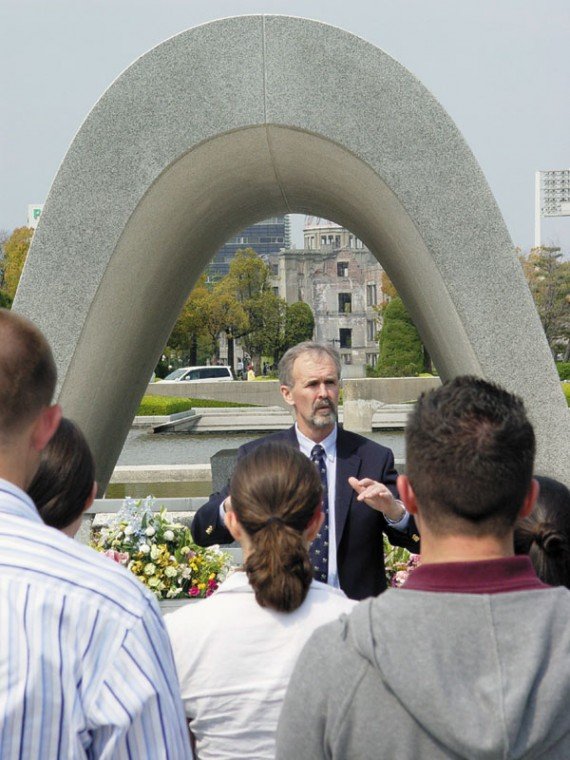Hiroshima, Japan
– Talking about Hiroshima and visiting the city itself are two
incredibly different things; much more so than I would ever have
expected. Pulling up to the Peace Plaza, standing where Little Boy
had been dropped on that August day not so long ago, was …
amazing.
Hiroshima, Japan – Talking about Hiroshima and visiting the city itself are two incredibly different things; much more so than I would ever have expected. Pulling up to the Peace Plaza, standing where Little Boy had been dropped on that August day not so long ago, was … amazing.
The museum itself was incredible: There were huge panels explaining the history of Hiroshima, the conflicts leading up to the bombing and the aftermath of the event.
Giant photographs of decimated buildings stretched across the walls, and tattered remains of clothing and shoes and books sat inside glass cases.
But beside the information and the artifacts, the very structure itself was astounding – two huge buildings, a giant garden full of flowers and trees, a large stone monument commemorating the tragedy and actual remains of one of the original buildings that was partially destroyed from the bombing.
To look around and see all this, knowing that at one point people were dying in the streets, burnt and sick from radiation, black ash fluttering down from the sky and covering the fragments of the city, was mind-boggling.
“I had been anticipating the Hiroshima visit for quite a while,” senior Nora Hunt said. “I knew it would be a powerful experience, but it was even more than that. It provided me an opportunity to think about the issue of world peace and the choices made in history that have either inhibited or helped this quest. Monuments like the Peace Plaza are so important in terms of providing a tangible representation of what so many people want: Peace.”
Standing shoulder to shoulder, we gathered around the monument outside of the Peace Plaza, murmuring softly as Mr. (Phil) Robb laid a bouquet of flowers on the steps. After a moment of silence, we crowded around and sang three songs as an offering of respect. Up until this moment, I’d felt reverent, upset and even a little ashamed.
I was in awe of the base brutality human beings are capable of inflicting upon one another. But as soon as we began to sing, voices effervescing and drifting up into the air around us, an overwhelming sense of peace enveloped me.
I realized that while I was inside, I was overtaken by the shocking gravity of everything around me – vast models of a charred city, shards of broken glass that had been surgically removed from bodies, and blackened bits of clothing taken from the dead and wounded. Singing outside, with my closest friends around me, allowed me to see past the shock of the tragedy and understand the unity that’s been created from such abhorrent sorrow.
“It’s devastating what those people went through, but it’s still hard to imagine what the world would be like if the bomb had never been dropped,” senior Cambri Love said. “We wouldn’t have opportunities like this to travel or make relationships like the one Gilroy shaped with Takko-machi. The effects of dropping the bomb were terrible and it’s easy to say that we made a horrible decision, but I believe that afterward the U.S.A. made a wonderful decision to help them rebuild. That decision had made a positive difference – even for a common citizen like me who now has the opportunity to experience how wonderful the Japanese people are.”














